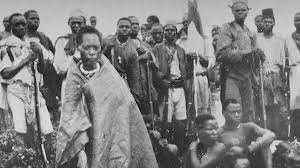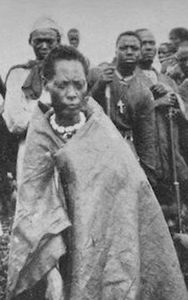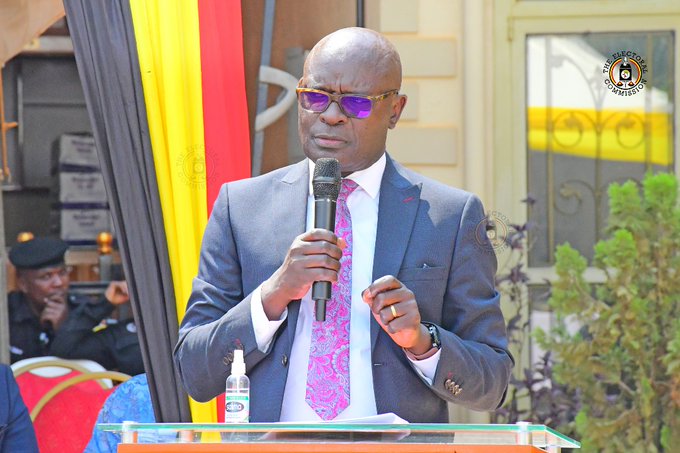Makerere, Uganda – In a rare study on the anti-colonial struggle in Uganda, Dr. Grace Kentaro’s Doctorate has elevated the place of anti-colonial warrior princess Muhumuza’s Nyabingi Movement.
In her study “Feminine Identity in Anti-Colonial Struggles: The Legacy of Muhumuza of the Nyabingi Movement in Kigezi, Uganda,” Dr. Kentaro who graduated on Friday with a Doctor of Philosophy from Makerere University, challenged historical orthodoxy by shedding light on the often-overlooked role of women in anti-colonial movements, particularly through the lens of Muhumuza in the Nyabingi Movement.
Background on the Nyabingi Movement
In the early twentieth century, two East African women took up arms against British and German colonialism.
Between 1900 and 1911 Muhumuza, or Muhumusa, a member of the Rwandan royal family and a medium of the deity Nyabingi launched a campaign against King Musinga, an ally of German colonialism.
Her charisma and spiritual power sparked the first armed responses to colonialism in the region, and her virulent anti-colonialism and anti-Christian stance resulted in a rare moment of European solidarity as German, British, Catholic, and Protestant actors came together to subdue her.
She was twice imprisoned and exiled in Bukoma and eventually Kampala, where she died under house arrest in 1945.
The Nyabingi Movement was a socio-religious and anti-colonial movement that emerged in pre-colonial Uganda, particularly in the Kigezi region in the late 1800s.
That struggle was led by a charismatic leader, a woman, who was believed to possess supernatural powers.
Muhumuza’s trailblazing movement was formed to resist colonial rule and promote indigenous cultural and religious practices.
Muhumuza, was a central figure in Kentaro’s research, because she played a crucial role in this movement, using her influence to mobilize resistance against the colonial powers.
Dr. Kentaro’s research challenges the prevailing historical narrative that often sidelines the contributions of women in anti-colonial struggles.

The study questions the conventional focus on male figures such as Nyerere, Kenyatta, Nkrumah, and Mandela, urging a reevaluation of historical perspectives to include the significant role played by female non-political personalities.
Dr. Kentaro used Muhumuza’s story as a powerful illustration of women’s agency in anti-colonial struggles. Muhumuza defied societal norms and gender roles of her time by actively participating in the resistance against colonial forces.
“Through the Nyabingi Movement, she employed religious fervor as a tool to advocate for the rights of her people and the sovereignty of Uganda,” she told this news website in an interview after graduation.
She said she highlights Muhumuza’s enduring legacy as a female identity who fought for the rights of the Banyakigezi and played a pivotal role in the multinational resistance against colonial rule.
“Muhumuza’s contributions, often overshadowed by her male counterparts, but are now documented and emphasized,” she said of her research.

Dr. Kentaro recommends a broader recognition of women heroines in various spheres of life, emphasizing the importance of acknowledging and documenting their contributions.
“My study serves as a call to action for historians and scholars to reevaluate historical narratives and ensure a more inclusive representation of women in anti-colonial movements,” she emphasized.
Dr. Kentaro’s research was funded by Gerda-Henkel Stiftung, reflecting the importance placed on understanding and documenting the overlooked narratives of women in history.
Her study was supervised by Prof. Josephine Ahikire and Dr. Florence Ebila, both respected scholars in the field.
Dr. Kentaro’s work not only contributes to the academic understanding of anti-colonial movements but also stands as a testament to the resilience and agency of women in the face of historical challenges.
About The Author
Arinaitwe Rugyendo
Rugyendo is the Founder and Editor-in-Chief of ResearchFinds News. He’s an accomplished journalist with a rich background in the media industry in Uganda. With over two decades of experience, Rugyendo has held various roles including cab reporter, Bureau Chief, Managing Editor, and Digital Media Editor at renowned publications such as Daily Monitor and Red Pepper. Throughout his career, he has demonstrated a commitment to delivering high-quality journalism and staying at the forefront of media trends. In addition to his journalistic pursuits, Rugyendo is currently pursuing a Ph.D. in Journalism and Communication at Makerere University. He has been recognized for his outstanding leadership and commitment to social change as a Desmond Tutu Fellow and Crans Montana New Leader. Rugyendo also serves as the Chairman of Young Engineers Uganda and Uganda Premier League, showcasing his dedication to promoting excellence and growth in various fields. With a passion for driving innovation and pushing boundaries in media, Rugyendo continues to make significant contributions to the industry. His vast experience, academic pursuits, and leadership roles make him a respected figure in the Ugandan media landscape.















